Introduction: In this article, Melissa Davenport Berry concludes her story about a spooky murder mystery that happened in Salem, Massachusetts, in 1830 and shocked the country, focusing on the murder trial. Melissa is a genealogist who has a blog, AnceStory Archives, and a Facebook group, New England Family Genealogy and History.
Today I conclude the story of Captain Joseph White’s murder in Salem, Massachusetts, that shocked the country. This mysterious murder inspired literary works by Nathaniel Hawthorne and Edgar Allan Poe, who both sourced from Daniel Webster’s courtroom summations and the trial transcripts. I found interesting newspaper articles that suggest some possible influences that roused these writers. (To catch up on the full story of this murder mystery, read my earlier articles linked below.)
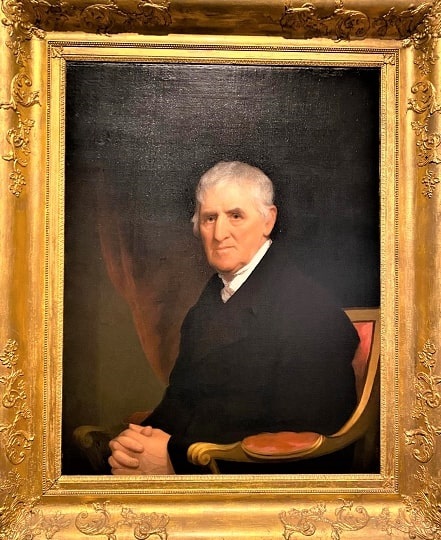
To recap: Capt. White met his maker on 6 April 1830. The motive for his murder was a mystery – although there was money and other valuables in his house, the killer took nothing. Eventually, two brothers – John Francis Knapp and Joseph Jenkins Knapp – were convicted of the murder of Capt. White and sentenced to death by hanging (a third participant in the murder plot, Richard Crowninshield Jr., committed suicide in his jail cell after being found guilty and before his hanging.)
Apparently, Joseph Knapp thought that if he could do away with Capt. White and steal the will (which was stored in a metal box in the Captain’s bedroom), his family would inherit half of the estate, since his mother-in-law was the childless Captain’s niece.
On 22 November 1830, Joseph J. Knapp was sentenced. Before formally sentencing Knapp, Judge Samuel Putnam addressed the defendant, as reported in the Haverhill Gazette.
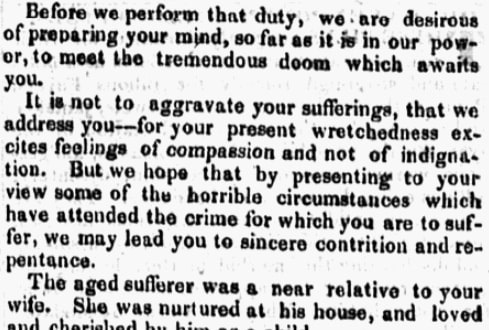
The judge’s words created a powerful image of an old man’s murder:
“The aged sufferer was a near relative to your wife. She was nurtured at his house, and loved and cherished by him as a child. You were admitted to partake of his hospitality. You availed yourself of the opportunities to visit at the house of the deceased, to prepare the way for the entrance of your hired assassin, to the bed chamber of the victim. You were for months deliberately occupied in devising the ways and means of his death. Horrible to think! While you were eating his bread, at his own table, you were plotting against his life. The execution of this awful conspiracy spread dismay, anxiety, and distrust through the country. Week after week passed away – and left the dreadful deed veiled in mystery. At length a discovery was made by means almost as extraordinary as was the crime. If such events had been set forth in a work of fiction, they would have been considered as too absurd and unnatural for public endurance. The story would have been treated as a libel upon Man.”
The judge’s concluding words to Knapp:
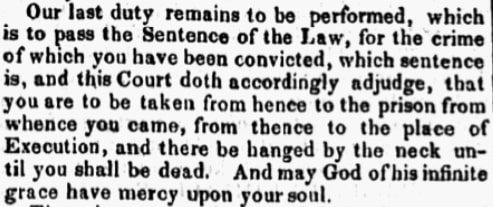
Like his contemporaries, Nathaniel Hawthorne followed the trials of the Knapp brothers for the murder of Captain White. On 1 September 1830, Hawthorne wrote to John Dike on the prospect of Joseph Knapp’s upcoming execution:
“Many people suspect Mrs. Bickford [Capt. White’s niece, and Knapp’s mother-in-law] and her daughter, Knapp’s wife, of being privy to the whole affair before the murder was committed. I cannot say whether there are good grounds for these suspicions, but I know it was daily expected, during the trial, that one or both would be arrested; and it is said that they were examined at the house of Mr. Brown the jailer. It is certain that Joseph Knapp’s wife has twice attempted to hang herself. The first time was soon after her husband’s arrest, and the second immediately after he was found guilty. [Joseph] Knapp also made a similar attempt, a little while ago, and was cut down by his son Phippen. The poor old man is entirely broken in his mind and almost crazy.”
— Source for Hawthorne letter: Edward B. Hungerford in “Hawthorne Gossips about Salem,” published in the New England Quarterly, Vol. 6, No. 3, 1933.
Although Mrs. Bickford/Beckford (there are various spellings in various records) and her daughter were never arrested, rumors circulated about their ties to the crime.
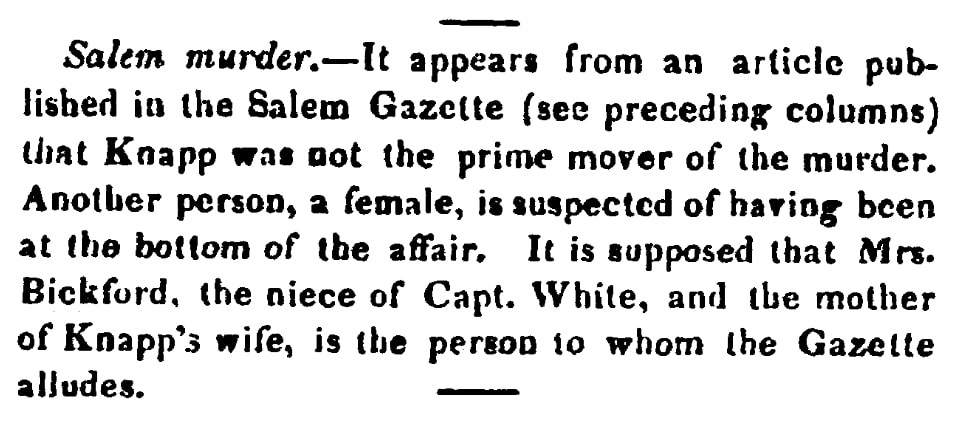
Some sources suspect that Hawthorne acted as a reporter for the Salem Gazette and may have covered the Knapp brothers’ trials for the newspaper. For example, this report was published on the morning of John Francis “Frank” Knapp’s execution, a grim account written in Hawthorne’s style:
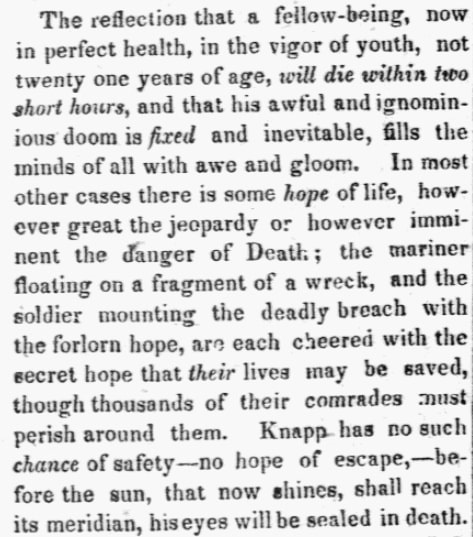
That wraps up my four-part series on the murder of Captain Joseph White. Next, I will resume my series on descendants of the Mayflower Pilgrims that I started last month.
Note: Just as an online collection of newspapers, such as GenealogyBank’s Historical Newspaper Archives, helped tell the stories of the murder trial for Capt. Joseph White, they can tell you stories about your ancestors that can’t be found anywhere else. Come look today and see what you can discover!
Note on the header image: portrait of Judge Samuel Putnam from “Chronicles of Danvers (Old Salem Village] Massachusetts, 1632-1923,” Harriet Sylvia Tapley, 1923, page 66.
Related Articles:
